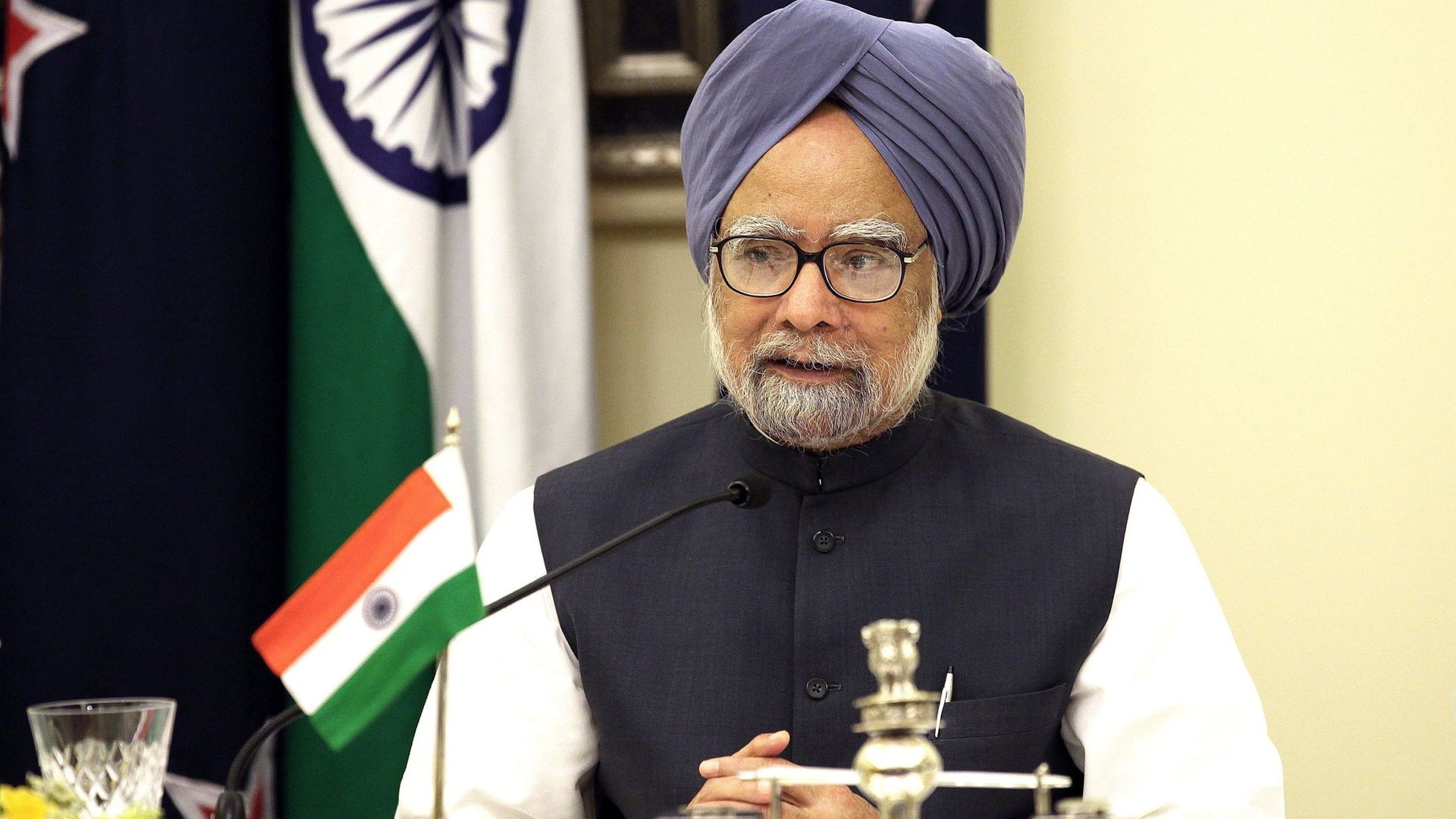尊敬的用戶您好,這是來自FT中文網的溫馨提示:如您對更多FT中文網的內容感興趣,請在蘋果應用商店或谷歌應用市場搜尋「FT中文網」,下載FT中文網的官方應用。
India’s former prime minister Manmohan Singh, who died aged 92 on Thursday, launched a transformative liberalisation of the state-controlled economy during a 1991 currency crisis, putting the country on a long-term trajectory of faster growth and rising global influence.
印度前總理曼莫漢•辛格(Manmohan Singh)於週四去世,享年92歲。在1991年的貨幣危機期間,他啓動了對國家控制經濟的變革性自由化改革,使印度走上了長期快速成長和全球影響力提升的軌道。
As finance minister from 1991 until 1996, Singh overcame entrenched political resistance to end decades of isolation and stagnation, open India’s doors to greater foreign trade and private investment, and begin its integration into the global economy.
從1991年到1996年擔任財政部長期間,辛格克服了根深蒂固的政治阻力,結束了數十年的孤立和停滯,爲印度打開了更多對外貿易和私人投資的大門,並開始融入全球經濟。
The Oxford-trained economist, known for his mild, self-effacing manner and personal integrity, was subsequently tapped by Sonia Gandhi, the Italian-born Congress party leader, to serve as premier after the party’s shock electoral victory in 2004.
這位在牛津大學受訓的經濟學家以溫和、謙遜的態度和個人誠信著稱。在2004年國大黨意外贏得選舉後,他被義大利出生的國大黨領袖索尼婭•甘地(Sonia Gandhi)選中擔任總理。
Singh was considered by Gandhi a safe, technocratic choice to lead India, who would not emerge as a political rival to her or her young son, Rahul, whom she was grooming to eventually take over the party leadership.
甘地認爲辛格是一個安全的技術官僚人選來領導印度,他不會成爲她或她年輕的兒子拉胡爾的政治對手,而她正在培養拉胡爾最終接管黨的領導。
During his premiership, Singh’s hope of continuing India’s economic reforms was thwarted by Congress’s coalition partners, which objected to many of the measures he wished to pursue.
在辛格擔任總理期間,他希望繼續推進印度的經濟改革,但國大黨的聯盟夥伴反對他想推行的許多措施,阻礙了他的計劃。
His second term in office from 2009 was seen as opportunity to press ahead with more dramatic reforms. But he ended up weak and isolated within his party as high-profile corruption scandals plagued his administration.
他從2009年開始的第二個任期被視爲推進更大規模改革的契機。但由於備受矚目的腐敗醜聞困擾著他的政府,他最終在黨內變得軟弱無力,孤立無援。
Born in 1932 in a rural village in what is today part of Pakistan, Singh, a member of the Sikh faith, migrated to India when British-ruled India was divided into Hindu-majority India and Muslim-majority Pakistan.
辛格於1932年出生在一個如今屬於巴基斯坦的農村村莊。作爲錫克教徒,在英屬印度被分爲印度教佔多數的印度和穆斯林佔多數的巴基斯坦時,他遷移到了印度。
He attended university in India, then obtained a degree from Cambridge and a PhD in economics from Oxford, writing a thesis and book entitled “India’s Export Trends and Prospects for Sustained Growth”.
他在印度上大學,然後獲得劍橋的學位,並在牛津大學獲得經濟學博士學位,撰寫了一篇題爲《印度的出口趨勢及持續成長前景》的論文和書籍。
It challenged India’s then pervasive export pessimism that was to blight its development for a further three decades. Singh subsequently worked for several years at the United Nations Conference on Trade and Development.
這對當時印度普遍存在的出口悲觀情緒提出了挑戰,這種情緒在接下來的三十年中繼續阻礙其發展。隨後,辛格在聯合國貿易和發展會議工作了數年。
In 1969, he returned to India to teach economics. Then in 1971, Singh took up a post as economic adviser in the commerce ministry, the start of a long career in government service in which he held many top posts, including governor of the Reserve Bank of India.
1969年,他回到印度教授經濟學。1971年,辛格在商務部擔任經濟顧問,開啓了他在政府服務中的漫長職業生涯,期間他擔任了許多高級職位,包括印度儲備銀行(Reserve Bank of India)行長。
But his fundamental role in transforming India came in 1991, as it was facing a severe foreign exchange crisis, which had forced the country to fly some of its gold reserves abroad as security for an IMF rescue loan.
但他在1991年對印度轉型的根本作用顯現出來,當時印度正面臨嚴重的外匯危機,這迫使該國將部分黃金儲備運往國外,作爲國際貨幣基金組織(IMF)救助貸款的擔保。
Singh seized the opportunity to break with the antitrade world view that had dominated India post-independence, and begin the process of opening up the country’s tightly controlled, socialist-oriented economy to greater private and foreign investment, bringing an end to an era of chronically low growth.
辛格抓住機會,打破了印度獨立後占主導地位的反貿易世界觀,開始了開放該國嚴格控制的社會主義導向型經濟的進程,吸引更多的私人和外國投資,結束了長期低成長的時代。
His steps, alongside prime minister P.V. Narasimha Rao, to dismantle the so-called “License Raj” of strict economic controls during his five-year tenure as finance minister laid the foundation for a rapid acceleration of India’s economic growth, hitting highs of nearly 9 per cent, up from an average of around 2 to 3 per cent.
在他擔任財政部長的五年任期內,他與總理納拉辛哈•拉奧(P.V. Narasimha Rao)一道,廢除了所謂的「許可證統治」嚴格經濟管制,爲印度經濟的快速成長奠定了基礎,成長率從平均約2%到3%躍升至接近9%的高點。
In his first term as prime minister from 2004, Singh created debt relief and job creation schemes for farmers, and sought to establish social welfare programmes to assist those yet to benefit from India’s accelerated growth.
在2004年首次擔任總理的任期內,辛格爲農民制定了債務減免和就業創造計劃,並努力建立社會福利項目,以幫助那些尚未從印度加速成長中受益的人。
He also tried to bring more transparency to government by implementing a freedom of information law, similar to those in the west.
他還試圖透過實施類似於西方國家的資訊自由法來提高政府的透明度。
But the most significant achievement was his transformation of New Delhi’s relationship with Washington, which had imposed sanctions on India for its nuclear tests a decade earlier.
但最重要的成就是他改變了新德里與華盛頓的關係,十年前,華盛頓曾因印度的核試驗而對其實施制裁。
In 2008, he staked his political future on a quest to obtain parliamentary approval for a major civil nuclear agreement with the US, in spite of opposition from leftist former coalition partners and the Hindu nationalist Bharatiya Janata party.
2008年,他不顧左翼前聯盟夥伴和印度教民族主義政黨印度人民黨的反對,將自己的政治前途押在爭取議會批准與美國達成一項重大民用核協議上。
The successful parliamentary vote buried the legacy of cold war animosity between the two countries despite India’s refusal to relinquish its nuclear weapons programme, while sealing Singh’s unlikely friendship with the then US President George W Bush.
儘管印度拒絕放棄其核武器計劃,但成功的議會投票仍然埋葬了兩國之間冷戰敵意的遺產,同時鞏固了辛格與時任美國總統喬治•W•布希(George W Bush)之間出人意料的友誼。
Later that year, after Pakistan-based militants launched a seaborne terror strike on Mumbai, killing 170 people, Singh showed considerable restraint by resisting calls for harsh retaliation, thus averting a potential regional conflagration.
那年晚些時候,巴基斯坦的激進分子發動了一次海上恐怖襲擊,襲擊了孟買,造成170人死亡。辛格表現出相當大的剋制,抵制了嚴厲報復的呼聲,從而避免了一場潛在的地區性衝突。
With the benefit of hindsight, many of Singh’s advisers said he should have handed the premiership over to a younger leader after the election victory of 2009.
事後看來,辛格的許多顧問表示,他本應在2009年選舉勝利後將總理職位交給一位更年輕的領導人。
His second term was one of bitter disappointment and paralysis, marred by corruption scandals, unruly allies and an economy retreating from double-digit economic growth amid stubbornly high inflation.
他的第二個任期充滿了苦澀的失望和癱瘓,因腐敗醜聞、不守規矩的盟友以及在頑固高通膨下經濟從兩位數成長退步而蒙上陰影。
However, during this time, he did empower Nandan Nilekani, cofounder of tech giant Infosys, to lead a team that built an advanced biometric identification system known as Aadhaar, which gradually led to vast improvements in the delivery of welfare payments for millions of poorer Indians.
然而,在此期間,他確實授權印孚瑟斯(Infosys)的聯合創辦人南丹•尼勒卡尼領導一個團隊,建立了一個名爲Aadhaar的先進生物識別系統,這逐漸大大改善了數百萬印度貧困人口的福利支付。
Still, public disillusionment with Singh’s seeming inaction as economic and political conditions deteriorated paved the way for the 2014 election of the BJP leader Narendra Modi, who promised muscular leadership, faster job creation and accelerated growth.
儘管如此,隨著經濟和政治狀況的惡化,公衆對辛格似乎無所作爲的失望爲2014年印度人民黨(BJP)領導人納倫德拉•莫迪(Narendra Modi)的當選鋪平了道路。莫迪承諾提供強有力的領導、更快的就業創造和加速的經濟成長。
Singh kept a low profile after retirement, though he did make occasional public criticisms of his successor’s performance. In 2019 he accused Modi of creating a “toxic” environment and “climate of fear” that had led to a sharp economic slowdown by undermining business confidence.
辛格在退休後保持低調,儘管他偶爾會公開批評繼任者的表現。2019年,他指責莫迪製造了「有毒」的環境和「恐懼的氣氛」,削弱了商業信心,導致經濟急劇放緩。
During his final months as premier, back in 2014, Singh predicted that “history will be kinder to me than the contemporary media, or for that matter opposition parties”.
在2014年擔任總理的最後幾個月,辛格預測:「歷史將比當代媒體或反對黨對我更仁慈。」

